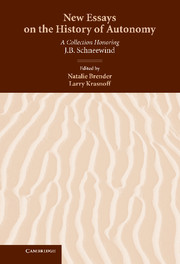Book contents
- Frontmatter
- Contents
- List of Contributors
- Acknowledgments
- Introduction
- PART ONE AUTONOMY IN CONTEXT
- 1 Justus Lipsius and the Revival of Stoicism in Late Sixteenth-Century Europe
- 2 Affective Perfectionism: Community with God without Common Measure
- 3 Autonomy and the Invention of Theodicy
- 4 Protestant Natural Law Theory: A General Interpretation
- 5 Autonomy in Modern Natural Law
- PART TWO AUTONOMY IN PRACTICE
5 - Autonomy in Modern Natural Law
from PART ONE - AUTONOMY IN CONTEXT
Published online by Cambridge University Press: 24 July 2009
- Frontmatter
- Contents
- List of Contributors
- Acknowledgments
- Introduction
- PART ONE AUTONOMY IN CONTEXT
- 1 Justus Lipsius and the Revival of Stoicism in Late Sixteenth-Century Europe
- 2 Affective Perfectionism: Community with God without Common Measure
- 3 Autonomy and the Invention of Theodicy
- 4 Protestant Natural Law Theory: A General Interpretation
- 5 Autonomy in Modern Natural Law
- PART TWO AUTONOMY IN PRACTICE
Summary
Morality seems to bind us in a special way. In part, this is because it can require us to do things, and not just recommend them. But our ends can generate a kind of requirement too. If I am bent on driving to Brighton and the only way of getting there is via US 23, there is a sense in which I am required to take that route. Still, this requirement is escapable or optional, since it arises only relative to my choice of end. I can avoid it entirely if I decide to drive to Chelsea rather than Brighton. Maybe what is special about morality, then, is that its requirements are inescapable or nonoptional. However, there are plenty of requirements, not themselves moral, that I cannot escape at my option. If I drive to Brighton, the law says I must carry a valid license with me, whether I want to or not. This requirement of Michigan law is not itself a requirement of morality, even if morality normally requires me to obey it. Philippa Foot famously made a similar point about etiquette. The prohibition on eating peas with a knife is not suspended if I want to impress my hosts with my digital dexterity or, perhaps especially, if I want to shock their socks off.
Philosophers frequently seek to capture the special character of moral requirements with the Kantian claim that they are categorical imperatives.
- Type
- Chapter
- Information
- New Essays on the History of AutonomyA Collection Honoring J. B. Schneewind, pp. 110 - 130Publisher: Cambridge University PressPrint publication year: 2004
- 2
- Cited by

